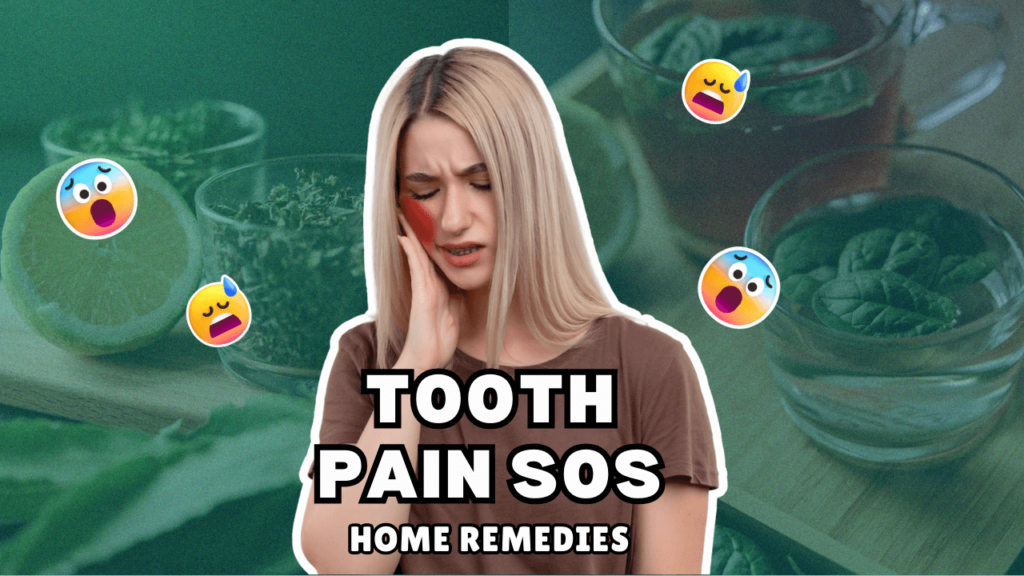Before we delve into remedies, it’s crucial to understand the nature of tooth pain. Toothaches are typically caused by dental issues such as cavities, infections, or gum problems. Nerve pain in the tooth can result from these underlying issues and can be particularly distressing. Now, let’s explore how to address this pain effectively.
What is the Fastest Way to Stop a Toothache?
When a toothache strikes, you want relief as soon as possible. Here’s how you can stop a toothache in its tracks:
- Rinse Your Mouth: Start by rinsing your mouth with warm water to remove debris or irritating particles.
- Salt Water Gargle: Mixing warm water with salt and using it as a mouthwash can help reduce inflammation and pain.
- Clove Oil: Applying a small amount to the affected area can temporarily relieve tooth pain.
- Vanilla Extract: Soaking a cotton ball in vanilla extract and placing it on the affected tooth can help numb the pain.

What Kills Tooth Pain?
Tooth pain is often the result of inflammation and infection. To eliminate it, focus on these remedies:
- Hydrogen Peroxide Rinse: Gargling with hydrogen peroxide and water can help kill bacteria causing pain.
- Food-Grade Hydrogen Peroxide: Be cautious and use food-grade hydrogen peroxide for oral health.
- Root Canal: A root canal may be necessary to remove the infected nerve and alleviate pain in severe cases.
How Can I Stop Nerve Pain in My Tooth?
Nerve pain can be particularly intense. Here’s how you can find relief:
- Home Remedies: Besides clove oil and vanilla extract, consider using over-the-counter pain relievers to manage nerve pain.
- Temporary Relief: Placing a cold compress on your cheek near the affected tooth can provide temporary relief.
- Consult a Dentist: If the pain persists, consult a dentist to identify the underlying issue and explore long-term solutions.
Will Tooth Nerve Pain Go Away?
The duration of tooth nerve pain varies, but it’s essential to address it promptly:
Immediate Relief: The methods mentioned above can provide immediate relief, but the pain may return if the underlying issue persists.
Consultation: If tooth nerve pain continues, consult a dentist to determine the best action.

Home Remedies for Tooth Pain Relief
For those seeking natural and home-based solutions, these remedies can be highly effective:
How to Relieve Tooth Pain Naturally
- Cotton Ball Soak: Soak a cotton ball in warm water and place it on the painful tooth to soothe the area.
- Salt Water Rinse: Rinse your mouth with a warm salt water solution multiple times daily to reduce swelling.
- Affected Area Care: Maintain good oral hygiene, avoid hot or cold foods, and gently brush to prevent further irritation.
Tooth pain can be unbearable, but there are various ways to find relief. Whether you opt for quick fixes like rinsing with warm water or natural remedies like clove oil, it’s essential to address tooth pain promptly. If the pain persists, consulting a dentist is crucial to identify and treat the underlying issue.

FAQs (Frequently Asked Questions)
1. How long do toothaches last?
The duration of a toothache can vary. It may be brief and temporary or persist until the underlying issue is resolved. Seeking dental care is advisable for persistent pain.
2. What is the fastest way to stop a toothache?
Rinsing your mouth with warm water, using salt water as a mouthwash, and applying clove oil or vanilla extract to the affected tooth are quick ways to alleviate toothache pain.
3. Are there home remedies for tooth nerve pain?
Home remedies such as cotton ball soaks, salt water rinses, and good oral hygiene can help relieve tooth nerve pain.
4. When should I see a dentist for tooth pain?
Suppose tooth pain is severe, persistent, or accompanied by other symptoms like swelling or fever. In that case, it’s essential to consult a dentist promptly for a proper diagnosis and treatment.
5. Can I prevent tooth pain?
Maintaining good oral hygiene practices, including regular brushing and flossing, can help prevent tooth pain. Regular dental check-ups can also identify and address potential issues before they become painful.



